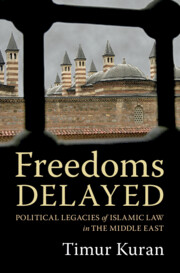Book contents
- Freedoms Delayed
- Freedoms Delayed
- Copyright page
- Dedication
- Contents
- Figures
- Tables
- Preface
- Part I The Modern Middle East’s Authoritarian Face
- Part II Persistent Social Atomization
- 3 Nongovernmental Organizations under Islamic Law
- 4 The Political Impotence of Islamic Waqfs
- 5 Waqf Corruption and Its Degradation of Civic Life
- 6 The Islamic Waqf’s Long Civic Shadow
- Part III Religious Repression
- Part IV Economic Hindrances
- Part V Conclusion
- Notes
- Bibliography
- Index
5 - Waqf Corruption and Its Degradation of Civic Life
from Part II - Persistent Social Atomization
Published online by Cambridge University Press: 20 July 2023
- Freedoms Delayed
- Freedoms Delayed
- Copyright page
- Dedication
- Contents
- Figures
- Tables
- Preface
- Part I The Modern Middle East’s Authoritarian Face
- Part II Persistent Social Atomization
- 3 Nongovernmental Organizations under Islamic Law
- 4 The Political Impotence of Islamic Waqfs
- 5 Waqf Corruption and Its Degradation of Civic Life
- 6 The Islamic Waqf’s Long Civic Shadow
- Part III Religious Repression
- Part IV Economic Hindrances
- Part V Conclusion
- Notes
- Bibliography
- Index
Summary
Every Islamic waqf that adhered to its deed eventually became dysfunctional because of unanticipated changes in conditions. But not all waqfs were managed rigidly. Relaxed legal interpretations enabled waqf caretakers to depart, albeit within limits, from the founder’s instructions. But courts had the final say on whether a caretaker was complying with the deed and, insofar as he was not, whether his exceptions were justified. A judge could rule that the founder, were he alive, would have authorized certain changes that the deed did not explicitly allow. Alternatively, he could treat them as incompatible with the waqf’s spirit. He was thus the arbiter of what resource reallocations were legal. Unsurprisingly, this judicial privilege was abused. Judges commonly withheld permission for a managerial or financial adjustment until they were bribed. So central was the waqf to the region’s premodern economy that efforts to transgress its rules promoted a culture of corruption. Our primary interest here lies in the political consequences. In societies with rampant corruption, individuals tend to solve their problems with the state through bribery and reciprocal favors. They find personal solutions easier than trying to form coalitions with others facing similar challenges. Civil society suffers.
Keywords
- Type
- Chapter
- Information
- Freedoms DelayedPolitical Legacies of Islamic Law in the Middle East, pp. 77 - 88Publisher: Cambridge University PressPrint publication year: 2023

